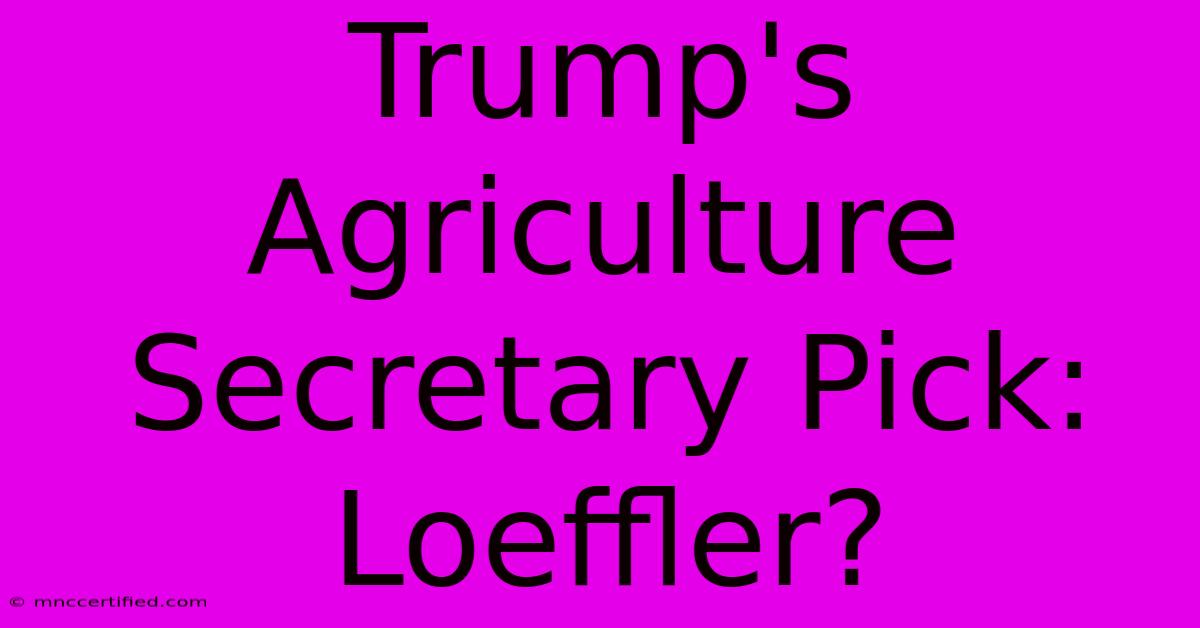Trump's Agriculture Secretary Pick: Loeffler?

Table of Contents
Trump's Agriculture Secretary Pick: Loeffler? Exploring the Possibilities and Implications
The selection of a Secretary of Agriculture is a pivotal moment for any US administration, shaping agricultural policy and impacting the livelihoods of millions. With a potential vacancy or upcoming appointment cycle, speculation naturally arises regarding potential candidates. One name frequently mentioned is that of Kelly Loeffler, and exploring her background and qualifications in relation to this critical role is crucial. This article will delve into the possibility of Loeffler becoming the next Agriculture Secretary, examining her strengths, weaknesses, and the potential implications of such an appointment.
Kelly Loeffler: A Closer Look at the Potential Nominee
Kelly Loeffler, a businesswoman and former United States Senator from Georgia, possesses a unique background that presents both advantages and challenges in the context of the Agriculture Secretary position. While lacking direct agricultural experience in the traditional sense, her career demonstrates certain relevant skills. She brings a strong financial acumen, having built a successful career in the financial sector, which could be beneficial in managing the substantial USDA budget and navigating complex economic issues within the agricultural industry.
Strengths: Financial Expertise and Political Connections
Loeffler's financial background is arguably her greatest asset. Understanding financial markets, budget management, and economic forecasting are crucial for navigating the complexities of agricultural subsidies, trade negotiations, and the overall economic health of the farming sector. Her experience as a Senator also provides extensive political connections and familiarity with the legislative process – invaluable for effectively advocating for agricultural interests within Congress.
Weaknesses: Lack of Direct Agricultural Experience and Potential Controversies
A significant concern surrounding Loeffler's potential candidacy lies in her lack of direct experience in agriculture. Critics argue that this deficit could hinder her ability to understand the unique challenges facing farmers and effectively represent their needs. Additionally, her past political controversies and stances on certain issues might face significant scrutiny during the confirmation process. A thorough examination of her record is necessary to assess the potential impact on her ability to serve as an effective and unifying Agriculture Secretary.
Implications of a Loeffler Appointment
The appointment of Kelly Loeffler would have far-reaching implications for the future direction of US agricultural policy. Her financial expertise could lead to a focus on market-based solutions and economic efficiency within the agricultural sector. However, her lack of direct farming experience might lead to concerns about her ability to fully empathize with the needs of farmers and rural communities.
Potential Policy Shifts: A Focus on Market Efficiency?
A Loeffler-led USDA could potentially prioritize policies that promote market efficiency and competitiveness. This might involve streamlining regulations, fostering innovation in agricultural technology, and strengthening international trade relationships. However, this approach might also risk neglecting the needs of smaller farms and potentially exacerbate existing inequalities within the agricultural sector.
Reaction from Agricultural Stakeholders: Concerns and Expectations
The agricultural community exhibits a diverse range of opinions on Loeffler's potential appointment. While some might welcome her financial expertise and political connections, others express concerns about her lack of direct agricultural experience and the potential for policy decisions that overlook the specific needs of farmers. A comprehensive understanding of these varied perspectives is essential for gauging the potential impact of her appointment.
Conclusion: Uncertainty and the Need for Transparency
The possibility of Kelly Loeffler becoming the next Agriculture Secretary presents a scenario fraught with both potential benefits and significant challenges. Her financial acumen and political experience offer valuable assets, but her lack of direct agricultural experience raises legitimate concerns. Transparency and a thorough vetting process are crucial to ensure the selection of a candidate who can effectively represent the interests of the entire agricultural sector and foster a sustainable and prosperous future for American agriculture. The coming months will offer further clarity on this critical appointment.

Thank you for visiting our website wich cover about Trump's Agriculture Secretary Pick: Loeffler?. We hope the information provided has been useful to you. Feel free to contact us if you have any questions or need further assistance. See you next time and dont miss to bookmark.
Featured Posts
-
Auto Insurance Grand Prairie Tx
Nov 23, 2024
-
Gatwick Airport Bomb Scare Terminal Back Open
Nov 23, 2024
-
Clements Dual Focus Points And Play
Nov 23, 2024
-
Lacey Turner Leaving East Enders
Nov 23, 2024
-
Tonights Top News Headlines
Nov 23, 2024